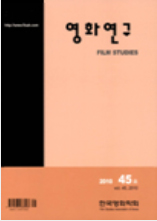- 영문명
- Bong, Joon-ho's 'Mother' as an Allegorical Film: Tragic Properties of Contemporary Korean History Presented in Film
- 발행기관
- 한국영화학회
- 저자명
- 김금동
- 간행물 정보
- 『영화연구』제45호, 7~33쪽, 전체 27쪽
- 주제분류
- 예술체육 > 예술일반
- 파일형태
- 발행일자
- 2010.09.30
6,040원
구매일시로부터 72시간 이내에 다운로드 가능합니다.
이 학술논문 정보는 (주)교보문고와 각 발행기관 사이에 저작물 이용 계약이 체결된 것으로, 교보문고를 통해 제공되고 있습니다.

국문 초록
영문 초록
Bong, Joon-ho's seems to deal with insane maternal affection. However, the film contains too many vague and unclear scenes to be considered drawing only a mad mother's love, and as these obscure and uncertain scenes don't belong tightly to narrative of maternal affection, it sometimes seems to be unnecessary and useless. This study examines on what ‘layer of meaning’ is hidden behind ‘layer of surface’ of maternal affection in Mother as an allegorical film, relying upon the fact that the obscurity and ambiguity Mother has are in line with the discontinuous and fragmented aspects of allegories in Walter Benjamin’s 『The Origin of German Tragic Drama(Ursprung des deutschen Trauerspiels)』. Events surrounding Hyeja and Dojun; Jintae and Ajeong; and the old man in a junkyard, etc. describe tragic contemporary Korean history and citizens as the subjects who have led the contemporary history. Dojun and Jintae signify the South and the North Korean governments, respectively, born as twins by the tragedy of the national division after Japanese occupation period; Hyeja who is in a mother-son relationship, the citizens who established the South Korean regime; Mina who is a daughter of the Manhattan, the U.S.; Ajeong, many youths who had been sacrificed while shouting for democratization criticizing the violation of human rights; and the old man in the junkyard, the uncomfortable truth of history which we want to throw away like junks. The film depicts through character of Hyeja our image as the people who have undemocratic and violent propensity and our portrait as the subjects of history who make tragic history repeated by distorting, hiding and forgetting our own images and realities. Moreover, through the relationships among all characters, the film describes the issue of the division after the independence; that of ending pro-Japanese sentiment by South Korea and North Korea; the hostile, symbiotic relationship between South Korea and North Korea; and the relationship between North Korea and the U.S. over the issue of nuclear weapons. Like this, the film hides the layer of meaning of the tragic contemporary Korean history; the repetition of tragic history; and the relationship between them and our portrait as the people who are undemocratic and violent; who distort, hide and forget the truth under the surface layer of maternal affection. The director's view on the tragic and desperate history contained in the layer of meaning of Mother doesn't originate from the sense of despair from the salvation that is no longer realizable but from recognizing the desperate situations from beginning to end from the persistent recognition. Mother, based on the results of such a recognition, thus, suggests an insight through which we can see through all the tragic properties of contemporary Korean history, getting out of a step of simple accumulation of historical facts or of the faithful description of the facts.
목차
1. 들어가며
2. 진태
3. 혜자 그리고 도준
4. 문아정과 고물상 노인
5. 맺음말
키워드
해당간행물 수록 논문
- 중국영화시장에 나타난 변증법적 현상의 지형도
- 알폰소 쿠아론의 롱테이크 미학
- 미국 개봉 한국영화의 문화 담론 연구
- <똥파리>에 나타난 민족지성(Ethnographicness) 고찰
- 미군정기(1945-1948) 외화의 수용과 근대성
- 알레고리 영화로서의 <마더>
- 파시즘과 눈물
- 디지털매체와 영화의 재설정
- 허진호 영화의 깊이 연출 연구
- 식민지 조선영화에 있어 근대성에의 욕망과 초민족적 경향에 대한 연구
- 일제말기 조선영화에 재현된 친일 협력에 대한 연구
- 일제하 카프 영화인의 전향 논리 연구
- 액션 스릴러 ‘본(Bourne)시리즈’ 연구
- 영화산업, 팬과 만나다
- 영화이미지를 향한 응시
- 작가의 주제를 투사하는 ‘장치’로써의 코미디
- 1950년대 외국 스릴러 장르의 한국적 수용양상
- 영화 <하녀>의 영상이미지를 통한 작품의 표현적 함의
참고문헌
관련논문
예술체육 > 예술일반분야 BEST
- 생성형 AI 도구와 디자이너의 협업 프로세스 개발 - 이미지를 통한 아이디어 확산에서 고해상도 렌더링까지
- 청소년기의 치료레크리에이션 프로그램을 적용한 디지털 디톡스(Digital Detox) 효과성 연구
- ‘일과 삶의 균형(Work-Life Balance)’ 척도 개발을 위한 연구
예술체육 > 예술일반분야 NEW
- Z세대 생활체육 동호인들의 SNS 중독 경향성과 불안정 성인애착이 완벽주의적 자기제시 및 우울에 미치는 영향
- 즐거움과 몰입을 통한 수익성 기대가 NFT 구매 의도에 미치는 매개효과 분석: UTAUT2와 합리적 무관심(RI)을 중심으로
- 생태체험이 청소년의 자연친밀감, 환경태도, 환경행동의도에 미치는 영향
최근 이용한 논문
교보eBook 첫 방문을 환영 합니다!

신규가입 혜택 지급이 완료 되었습니다.
바로 사용 가능한 교보e캐시 1,000원 (유효기간 7일)
지금 바로 교보eBook의 다양한 콘텐츠를 이용해 보세요!



